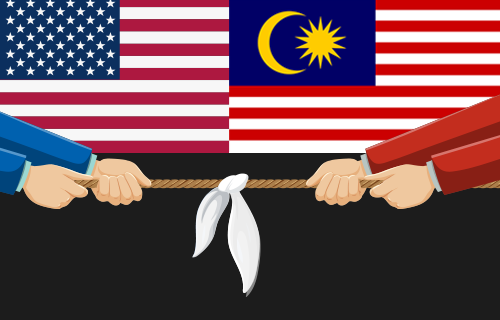IDEAS welcomes Indo-Pacific Economic Framework, but warns it should not derail ratification of CPTPP

Kuala Lumpur, 02 June 2022 – The Institute for Democracy and Economic Affairs (IDEAS) welcomed the Biden administration’s recent announcement of the Indo-Pacific Economic Framework (IPEF), arguing it could provide Malaysia with an avenue to collaborate with regional partners with regards to important economic and trade matters concerning the region, such as improving supply chain resilience and setting standards and rules for digital trade. That being said, IDEAS warned that progress on IPEF should not derail ongoing efforts to ratify the Comprehensive and Progressive Agreement for Trans-Pacific Partnership (CPTPP) by September 2022 as previously announced.
For context, IPEF is a US-led economic framework involving 13 countries, including the Quad members of the USA, India, Australia, and Japan, New Zealand and South Korea, and finally the ASEAN Member States of Brunei, Indonesia, Malaysia, the Philippines, Singapore, Thailand, and Viet Nam.
IPEF is not technically a free trade agreement similar to the CPTPP, but rather an economic framework for the participant countries to solidify their relationships and engage in crucial economic and trade matters that concern the region, such as building more resilient supply chains for the future. Some experts, however, argue that IPEF may provide the first steps towards a free trade agreement.
The four pillars of IPEF can be broken down as such:
- Connected Economy: establishing standards and rules for digital trade, such as cross border data flows;
- Resilient Economy: building more resilient supply chains able to withstand unexpected disruptions like the COVID-19 pandemic;
- Clean Energy: targeting green energy commitments and projects;
- Fair Economy: implementing fair trade policies, including rules targeting corruption and effective taxation.
As noted by IDEAS CEO, Tricia Yeoh, “The introduction of IPEF is welcomed, as it provides new avenues for Malaysia and the US to collaborate on crucial economic issues such as supply chain resilience and tackling corruption. With the absence of the US in the CPTPP agreement, Malaysia can tap into the American market to a certain extent through IPEF. As a small open economy, the more trading partners and economic frameworks Malaysia is part of (the latter including FTAs and general collaborative frameworks), the better for the economy.”
“However, while Malaysia should take full advantage of IPEF, it should not derail our ongoing efforts to ratify the CPTPP by September as anticipated. Unlike IPEF, the CPTPP is an actual free trade agreement, and therefore will have more significant and deeper economic benefit to the Malaysian economy.”’
As observed by Juita Mohamad, Director of the Economics and Business Unit at IDEAS, “Both IPEF and the CPTPP provide avenues for Malaysia’s further integration into the global economy. While this will provide long-term benefits to Malaysia’s economic development (particularly when it comes to raising productivity growth and producing more high value-added products efficiently), it will also bring short-term challenges which can be addressed and rectified by the government with the available policy space.”
“IDEAS identified several gaps through its recent roundtable discussions with industry players, such as the lack of skilled talents and ineffective one-stop investment centers in Malaysia. We recommend better coordination between government agencies and the industry players, which we believe will help elevate Malaysia’s status as a preferred trade destination, and allow us to fully utilise the benefits brought about by the CPTPP and IPEF for continued prosperity.”
— END —
Download Media Statement PDF FileHere
For enquiries, please contact:
Dr Juita Mohamad, Director, Economic and Business Unit
Acting Director of Research
T: +603 2070 8881/8882 | E: juita@ideas.org.my
Louis Denis, Manager, External Relations
T: +603 2070 8881/8882 | E: louis@ideas.org.my

